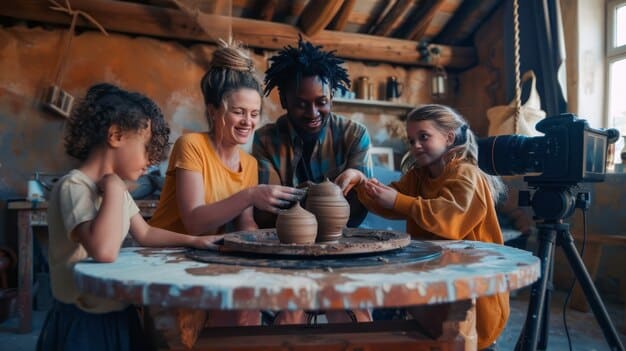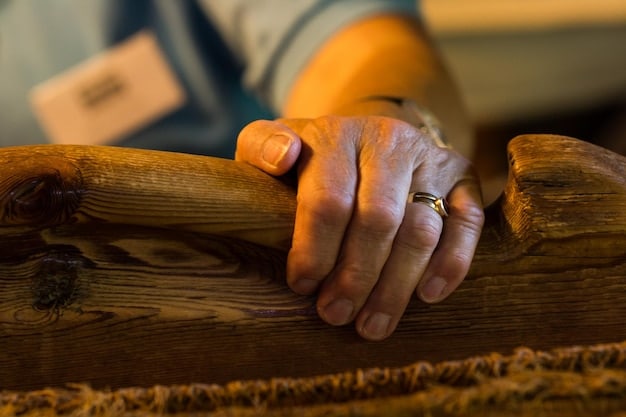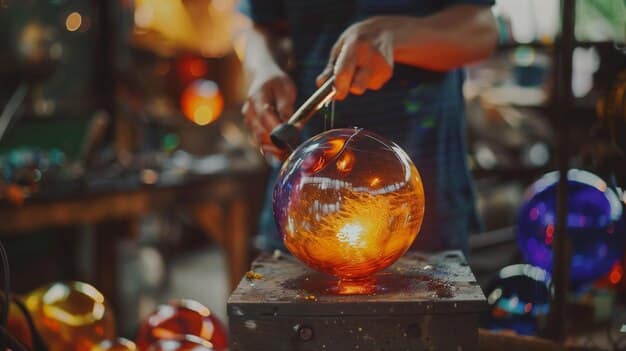Discover Authentic American Culture: Traditional Craft Workshops in the US

Experiencing Authentic American Culture through traditional craft workshops across the US offers a unique opportunity to connect with the nation’s heritage and learn time-honored skills from expert artisans.
Dive into the heart of America’s cultural heritage by experiencing authentic American culture through its traditional craft workshops. From pottery and weaving to woodworking and glassblowing, these workshops offer an immersive way to learn time-honored skills, connect with local artisans, and create lasting memories.
Unveiling Authentic American Craftsmanship
Authentic American craftsmanship is more than just creating objects; it’s about preserving traditions, sharing stories, and fostering a sense of community. By participating in traditional craft workshops, you’re not just learning a new skill, but also connecting with the rich history and cultural heritage of the United States. These workshops offer a hands-on experience that goes beyond the typical tourist attractions, providing a deeper understanding of American culture.
These workshops are also a fantastic way to unplug from the digital world and engage in a tactile, creative activity. Whether you’re a seasoned artist or a complete beginner, there’s a workshop out there that will spark your interest and ignite your passion.
The Allure of Hands-On Learning
One of the most appealing aspects of these workshops is the opportunity for hands-on learning. Instead of just reading about a craft, you get to actually try it yourself, guided by experienced artisans. This immersive approach not only enhances your understanding of the craft but also allows you to create something tangible that you can take home and cherish.
The satisfaction of creating something with your own hands is unparalleled. It’s a reminder that we are all capable of creating beauty and contributing to the world in our own unique way.
Preserving Tradition Through Craft
Many traditional crafts are at risk of being lost as modern technology and mass production take over. By participating in these workshops, you’re helping to preserve these valuable skills and ensure that they are passed on to future generations. You’re becoming a part of the story, helping to keep these traditions alive.
These workshops often serve as a vital link between the past and the present, connecting communities and fostering a sense of shared identity.
- Learn directly from skilled artisans and craftspeople.
- Engage in a tactile and creative learning experience.
- Contribute to the preservation of traditional skills.
- Create a unique and meaningful souvenir to take home.
In conclusion, exploring authentic American craftsmanship through workshops is a rewarding experience that allows you to connect with the nation’s heritage, learn new skills, and create lasting memories. These interactive experiences are a great way to support local artisans and contribute to the preservation of valuable traditions.

Exploring Diverse Craft Workshops Across the US
The United States offers a diverse range of traditional craft workshops, each reflecting the unique history and cultural influences of its region. From the Appalachian Mountains to the Southwest deserts, you can find workshops that specialize in a variety of crafts, from quilting and pottery to blacksmithing and Native American weaving.
The key to finding the perfect workshop is to research your interests and explore the different options available in the region you’re visiting. Many workshops are located in small towns and rural areas, offering a chance to escape the hustle and bustle of city life and immerse yourself in a more authentic American experience.
Quilting in the Appalachian Mountains
The Appalachian Mountains are renowned for their rich quilting tradition. In these workshops, you can learn the art of creating beautiful and intricate quilts from experienced quilters. You’ll learn about the history of quilting in the region, the different patterns and techniques used, and the importance of quilting in Appalachian culture.
Quilting is more than just a craft; it’s a form of storytelling, a way to preserve memories and pass on traditions from one generation to the next.
Pottery in the Southwest
The Southwest is home to a vibrant pottery tradition, influenced by Native American techniques and designs. In these workshops, you can learn to create beautiful and functional pottery pieces using traditional methods, such as hand-coiling and pit-firing. You’ll learn about the different types of clay used in the region, the symbolism behind the designs, and the cultural significance of pottery in Native American communities.
Working with clay is a grounding experience, connecting you to the earth and allowing you to express your creativity in a tangible way.
Blacksmithing in New England
New England boasts a long and storied history of blacksmithing. Workshops in this region offer the opportunity to learn the ancient art of shaping metal with fire and hammer. From crafting decorative ironwork to forging functional tools, you’ll discover the strength and elegance of this traditional craft.
Blacksmithing is a demanding yet rewarding craft that requires both physical strength and artistic vision.
- Quilting in the Appalachian Mountains: Learn the art of creating intricate quilts.
- Pottery in the Southwest: Discover traditional Native American pottery techniques.
- Blacksmithing in New England: Forge metal into decorative and functional items.
- Woodcarving in the Pacific Northwest: Craft intricate designs from local wood.
In short, exploring the diverse craft workshops across the US provides a unique window into the country’s cultural tapestry. Each region offers its own specific traditions and techniques to discover. Whether you are interested in textiles, pottery, metalwork, or woodworking, there’s a workshop to spark your creativity.
Finding the Right Workshop for You
With so many craft workshops available, finding the right one for you can seem daunting. However, by considering your interests, skill level, and travel plans, you can narrow down your options and find a workshop that is both enjoyable and enriching. Start by thinking about what crafts you find most appealing and then research workshops in regions that are known for those crafts.
Don’t be afraid to try something new! Even if you have no prior experience, many workshops cater to beginners and offer a supportive and encouraging environment for learning.
Consider Your Interests
The first step in finding the right workshop is to consider your interests. Are you drawn to textiles, pottery, metalwork, woodworking, or something else entirely? Once you have a general idea of what you’re interested in, you can start researching workshops that specialize in that craft.
Think about the types of projects you’d like to create. Do you want to make functional items, decorative pieces, or something in between?
Assess Your Skill Level
It’s important to assess your skill level before signing up for a workshop. Some workshops are designed for beginners, while others are geared towards more experienced artisans. Be honest about your abilities and choose a workshop that will challenge you without being overwhelming.
Many workshops offer different levels of instruction, so you can start with a beginner class and then move on to more advanced techniques as you progress.
Check Reviews and Recommendations
Before booking a workshop, take some time to read reviews and recommendations from other participants. This can give you valuable insights into the quality of the instruction, the atmosphere of the workshop, and the overall experience.
Look for workshops that have consistently positive reviews and that are known for their experienced and supportive instructors.
- Define your craft interests and preferred project types.
- Objectively evaluate your current skill level and choose accordingly.
- Read reviews and seek recommendations for quality assurance.
- Factor in location and travel practicality.
To summarize, finding the right craft workshop involves personal reflection, research and consideration. By aligning the workshop with your personal interests, skill level and logistical needs, you ensure yourself a rewarding and fulfilling arts experience. Remember to prioritize workshops with positive reviews and established reputations.

The Benefits of Immersing Yourself in Craft
Immersing yourself in a craft workshop offers a multitude of benefits, both tangible and intangible. Not only will you learn a new skill and create something beautiful, but you’ll also experience a sense of accomplishment, connect with like-minded people, and gain a deeper appreciation for the art of craftsmanship.
These immersive experiences can be transformative, allowing you to tap into your creativity, reduce stress, and discover hidden talents. By stepping outside of your comfort zone and trying something new, you open yourself up to a world of possibilities.
Reduced Stress and Improved Well-being
Engaging in a creative activity, such as a craft workshop, can be a powerful way to reduce stress and improve your overall well-being. The act of creating something with your hands can be incredibly therapeutic, allowing you to focus on the present moment and let go of anxieties and worries.
Crafting can also boost your self-esteem and give you a sense of purpose, knowing that you are capable of creating something beautiful and meaningful.
Enhanced Creativity and Problem-Solving Skills
Craft workshops can also help to enhance your creativity and problem-solving skills. By learning new techniques and experimenting with different materials, you’ll develop your ability to think outside the box and come up with innovative solutions. The problem-solving skills you develop in a craft workshop can be applied to other areas of your life, both personal and professional.
Crafting encourages experimentation and risk-taking, fostering a mindset of continuous learning and improvement.
Connection with Community
Craft workshops provide a unique opportunity to connect with like-minded people who share your passion for creativity and craftsmanship. You’ll meet new friends, learn from each other, and build a supportive community that can inspire and encourage you on your creative journey.
The sense of community that you find in a craft workshop can be incredibly enriching, providing a sense of belonging and shared purpose.
- Reduce overall stress and improve mental wellness.
- Enhance creative thinking and problem solving.
- Forge relationships and a sense of community.
- Gain an appreciation for art and cultural heritage.
In short, engaging in craft workshops has numerous benefits beyond simple skill acquisition. The immersion encourages stress relief, enhances one’s creativity, fosters relationships, builds community and instills an appreciation for art and culture. These benefits enhance holistic well-being and contribute to personal and intellectual enrichment.
Supporting Local Artisans and Economies
By participating in traditional craft workshops, you’re not only enriching your own life but also supporting local artisans and economies. These workshops often provide a vital source of income for artisans, helping them to preserve their skills and traditions for future generations. Your participation helps keep these art forms alive and thriving.
When you support local artisans, you’re also investing in the local economy, helping to create jobs and sustain communities. Your spending goes directly to the people who are creating the products, rather than to large corporations.
Direct Impact on Artisans’ Livelihoods
The fees you pay for a craft workshop go directly towards supporting the livelihoods of the artisans who are teaching the class. This income helps them to continue practicing their craft, buying materials, and maintaining their workshops. Your participation makes a tangible difference in their lives.
Many artisans rely on workshop income to supplement their traditional craft sales, providing them with a more stable and sustainable source of income.
Preservation of Cultural Heritage
By supporting local artisans, you’re also helping to preserve cultural heritage. Many traditional crafts are at risk of being lost as modern technology and mass production take over. Your participation in these workshops helps to keep these traditions alive and ensure that they are passed on to future generations.
Artisans are often the keepers of cultural knowledge, passing down skills and traditions from one generation to the next. Your support helps them to continue playing this vital role.
- Provide direct financial support to artisans, sustaining their craft.
- Contribute to preserving traditional skills and cultural heritage.
- Stimulate economic growth within local communities.
- Encourage cultural tourism.
To summarize, participating in craft workshops stimulates cultural preservation and positively impacts the economic wellbeing of local artisans. Your spending directly assists them in sustaining their livelihood and contributes to community economic growth. By doing so, you play an active role in keeping traditional crafts and skills alive for the further generations.
Planning Your Craft Workshop Adventure
Now that you’re inspired to embark on a craft workshop adventure, it’s time to start planning the details. From researching workshops and booking accommodations to packing your bags and preparing for the experience, careful planning can ensure that your trip is both enjoyable and enriching. Consider the time of year, location, and length of the workshop when making your plans.
Don’t forget to factor in travel time and transportation costs. If you’re traveling from out of state, you may need to book flights, rental cars, or other forms of transportation.
Research and Booking
The first step in planning your trip is to research and book your workshop. Look for workshops that align with your interests, skill level, and travel dates. Be sure to read reviews and check the workshop’s cancellation policy before booking.
Many workshops offer discounts for early booking or group registration, so be sure to take advantage of these opportunities.
Accommodation and Transportation
Once you’ve booked your workshop, it’s time to arrange accommodation and transportation. If the workshop is located in a small town or rural area, you may need to book a hotel or bed and breakfast in advance. Also, consider how you’ll get to and from the workshop each day. Will you need a rental car, or is public transportation available?
Some workshops offer on-site accommodation, which can be a convenient and cost-effective option.
Packing Essentials
When packing for your craft workshop adventure, be sure to bring comfortable clothing that you don’t mind getting dirty. Depending on the craft you’re learning, you may also need to bring specific tools or materials. Check with the workshop ahead of time to see what they provide and what you need to bring.
Don’t forget to pack your camera or smartphone to capture memories of your workshop experience.
- Conduct thorough workshop research and early booking.
- Arrange all accommodation and transportation needs.
- Pack appropriate clothing.
- Prepare to immerse in the experience to get the most rewards.
In conclusion, a successful arts workshop adventure results from diligent organisation and forethought. This entails detailed preliminary research, booking accommodations and logistics, bringing necessary clothes and gadgets, and being prepared to fully participate in order to maximize experiential results.
Showcasing American Culture at its Finest
Ultimately, experiencing authentic American culture through traditional craft workshops is a powerful way to connect with the nation’s heritage, learn new skills, and support local artisans and economies. These workshops offer an immersive and rewarding experience that goes beyond the typical tourist attractions, providing a deeper understanding of American culture.
By participating in these workshops, you’re not just learning a craft; you’re becoming a part of the story, helping to preserve valuable traditions and ensure that they are passed on to future generations. You’re also creating lasting memories and connecting with like-minded people who share your passion for creativity and craftsmanship.
Transformative Experiences
Craft workshops can be transformative experiences, allowing you to tap into your creativity, reduce stress, and discover hidden talents. By stepping outside of your comfort zone and trying something new, you open yourself up to a world of possibilities.
The sense of accomplishment you feel after completing a craft project can be incredibly rewarding, boosting your self-esteem and giving you a renewed sense of purpose.
Lasting Memories
The memories you make in a craft workshop will last a lifetime. You’ll treasure the friendships you forge, the skills you learn, and the unique creations you bring home. These experiences will enrich your life and broaden your horizons.
Craft workshops are a wonderful way to celebrate the beauty and diversity of American culture. They provide a platform for artisans to share their skills and traditions with the world, fostering a greater appreciation for the art of craftsmanship.
- Engage in art to learn new skills that benefit the artistically inclined.
- Forge connections.
- Find creative expression that has lasting benefits.
- Foster and preserve America cultural inheritance.
From start to finish, craft workshops create a memorable and transformative experience, facilitating artistic learning, encouraging networking, supporting self-expression and facilitating retention of American Culture heritage.
| Key Point | Brief Description |
|---|---|
| 🎨 Skill Acquisition | Learn traditional crafts like pottery, weaving, and blacksmithing. |
| 🤝 Community Connection | Meet artisans and fellow enthusiasts, fostering a sense of community. |
| 💸 Local Economy Boost | Support local artisans and stimulate economic growth in small towns. |
| 🛡️ Cultural Preservation | Help preserve valuable traditions and ensure they are passed to future generations. |
Frequently Asked Questions
▼
You can find workshops in pottery, weaving, woodworking, blacksmithing, glassblowing, quilting, and many other traditional crafts that showcase American cultural heritage.
▼
Yes, many workshops are designed for beginners, providing a supportive environment for learning new skills with no prior experience required, only the desire to learn.
▼
Search online for craft workshops in your desired region or ask for recommendations from local arts organizations and cultural centers to find workshops that fit your needs.
▼
Bring comfortable clothing, any personal tools required, eagerness to learn and inspiration. Check with the workshop provider for a full essentials list beforehand.
▼
Supporting local artisans helps preserve cultural heritage and stimulates the local economy by providing income that sustains ancient traditions and skills for future generations.
Conclusion
Experiencing authentic American culture through traditional craft workshops offers a unique and rewarding journey into the heart of American heritage and creativity, providing lasting memories, new skills, and a deeper connection to local communities and traditions.






